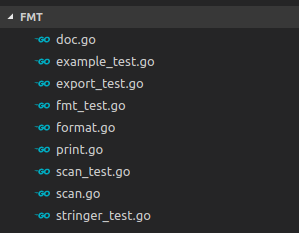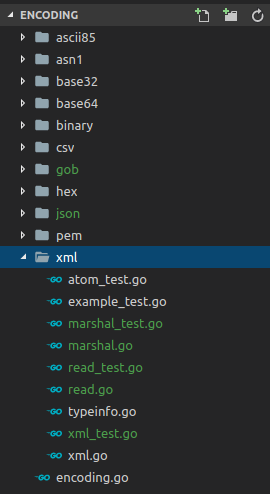Our Best Practises for writing beautiful and clean code in Go
// Make sure you name variables with Nouns and with its role
CountryCode := "UZ"
score := 50.0
// Booleans with adjectives
alive := true
// or
isSent := false// The same for functions, use CamelCase/camelCase
// name them with verbs
func increaseInt(i int) int {
return i++
}
// keep them short and descriptive, unlike
func increaseNumberByOneAndThisIsLongName(){
// Don't forget indenting
}// for Structs and Maps it's handy to use sigular nouns
type Person struct {
name string
age int
}
priceList := map[string]float{
"notebook": 15.0,
"pen": 24.99,
"bag": 149.99,
}
// And arrays and slices - plural
people := [5]Person{}
odds := []int{1,3,5,7,9} // Don't use the same variable - err for every error
// Here is the standard we use
ErrReadFail := errors.New("could not read file")
// and
ErrFileExists := errors.New("File Already Exists")
// but not
FileExistsError := errors.New("File Already Exists")`it's bad practice to name packages utils, helpers, ...`
`Use descriptive names and keep them short`
`standard library packages are the best example`
// such as one word describes all
import "archive"
// I can intuitively guess there are zip, tar and more compressors and uncompressors
// it was not named "tar.zip.things" // Group them the following order:
// first standard packages
// then external packages
// then project internal packages
import (
"fmt"
"net/http"
"github.com/gorilla/mux"
"./handlers"
)
// Order group alphabetically
// There are many extentions that take care of it// it's bad idea to declare variables outside the main function,
// though you may define constants outside.
import "net/http"
const (
API_ROOT = "https://example.com/api"
STATUS_OK = 200
...
)
func main(){
answer := otherFunc()
...
}
func otherFunc() int {
return 42
}
func anotherFunc(){
// some code
}`Seperate package into logical parts and store them in different files`
`Each having the same package name`
`it will keep files smaller and neat`
// Here is a classic example from standard packages: 'fmt' package`Sometimes codebase gets even larger and you can't keep them in one package`
`What you can do is gather all packages under one namespace by keeping packages in folder`
// Here is another classic example: 'encoding'Documenting is essential Everyday we read more code than we write First document of you code is itself, so again please write elegant code
`package should contain doc.go file`
`it will not participate in binary executable`
// This is where you should write extended documentation of your source codeMany people ask me which one is more important
My answer is both. You can still write performant code with high readality If you are doing some 'hacks', then explain why it works with comments One thing I am sure: Unreadable code can bring more problems than non-performat one.
`at NewMax we use: 'testing' and "github.com/stretchr/testify/assert"`
// one more thing to mention: don't write tests like this:// Bad
func TestAdd(t *testing.T) {
assert.Equal(t, 1+1, 2)
assert.Equal(t, 1+-1, 0)
assert.Equal(t, 1, 0, 1)
assert.Equal(t, 0, 0, 0)
}// Better
// write table driven tests, it's easier to add more tests and best practice.
func TestAdd(t *testing.T) {
cases := []struct {
A, B, Expected int
}{
{1, 1, 2},
{1, -1, 0},
{1, 0, 1},
{0, 0, 0},
}
for _, tc := range cases {
t.Run(fmt.Sprintf("%d + %d", tc.A, tc.B), func(t *testing.T) {
t.Parallel()
assert.Equal(t, t.Expected, tc.A+tc.B)
})
}
}Always indent code for better readablity, Preferably with 2 space indent level. We recommend goformat extenttion for visual studio code which formats your code when you save the file.
// Bad:
w = Wheel{Circle{Point{8, 8}, 5}, 20}with visual indent code is much more readible
// Better
w = Wheel{
Circle: Circle{
Point: Point{X: 8, Y: 8},
Radius: 5,
},
Spokes: 20,
}UTF-8
- Statistics of our usage:
- 50% - Visual Studio Code
- 25% - Sublime Text
- 25% - GoLand by JetBrains
// Bad:
var bd, err = sql.Open("postgres", "user=USER password=PASSWORD")
if dbErr == nil {
var rows, queryErr = db.Query("SQL Query")
if queryErr == nil {
// Some Code
}
}// Good:
var bd, err = sql.Open("postgres", "user=USER password=PASSWORD")
if dbErr != nil {
// Handle error
}
var rows, queryErr = db.Query("SQL Query")
if queryErr != nil {
// Handle error
}
//Some Code// Bad:
http.HandleFunc("/event/", eventHandler)
http.HandleFunc("/events/", eventsHandler)
func eventHandler(w http.ResponseWriter, r *http.Request) {
// Write Header
w.Header().Set("Content-Type", "application/json")
// Some Code
fmt.Fprintf(w, `{"text": "Event Registered"}`)
}
func eventsHandler(w http.ResponseWriter, r *http.Request) {
// Write Header
w.Header().Set("Content-Type", "application/json")
// Some Code
fmt.Fprintf(w, `{"text": "Events Registered"}`)
}// Good:
http.HandleFunc("/event/", Jsonify(eventHandler))
http.HandleFunc("/events/", Jsonify(eventsHandler))
// Reusable Func, like Decorators in Python
func Jsonify(f func(http.ResponseWriter, *http.Request)) http.HandlerFunc {
return func(w http.ResponseWriter, r *http.Request) {
w.Header().Set("Content-Type", "application/json")
f(w, r)
}
}
func eventHandler(w http.ResponseWriter, r *http.Request) {
// Some Code
fmt.Fprintf(w, `{"success": 1, "success_text": "Registered"}`)
}
func eventsHandler(w http.ResponseWriter, r *http.Request) {
// Some Code
fmt.Fprintf(w, `{"success": 1, "success_text": "Registered"}`)
}// or Even Better
http.HandleFunc("/event/json/", ContentType("application/json", jsonHandler))
http.HandleFunc("/event/xml/", ContentType("application/xml", xmlHandler))
func ContentType(ct string, f func(http.ResponseWriter, *http.Request)) http.HandlerFunc {
return func(w http.ResponseWriter, r *http.Request) {
w.Header().Set("Content-Type", ct)
f(w, r)
}
}
func jsonHandler(w http.ResponseWriter, r *http.Request) {
// Some Code
fmt.Fprintf(w, `{"success": 1, "success_text": "Registered"}`)
}
func xmlHandler(w http.ResponseWriter, r *http.Request) {
// Some Code
fmt.Fprintf(w, `<?xml version="1.0" encoding="UTF-8"?>
<root>
<success>1</success>
<success_text>Registered</success_text>
</root>`)
}// Not Good
func doConcurrently(job string, err chan error){
go func(){
fmt.Println("doing job:", job)
time.Sleep(1 * time.Second)
err <- errors.New("Something Went Wrong")
}
}
func main(){
jobs := []string{"one", "two", "three"}
errc := make(chan error)
for _, job := range jobs {
doConcurrently(job, errc)
}
for range jobs {
if err:=<-errc; err!=nil{
fmt.Println()
}
}
}// Better
func do(job string){
fmt.Println("doing job:", job)
time.Sleep(1 * time.Second)
return errors.New("Something Went Wrong")
}
func main(){
jobs := []string{"one", "two", "three"}
errc := make(chan error, len(jobs))
for _, job := range jobs {
go func(job string){
errc <- do(job)
}(job)
}
for range jobs {
if err:=<-errc; err!=nil{
fmt.Println()
}
}
}// It's our conventions
// You make your own
// Most important thing is team can communicate efficiently.

